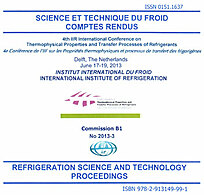
IIR document
Experimental study on cooling characteristics of a magnetocaloric device with two different types of magnetic refrigerants.
Number: pap. n. TP-073
Author(s) : HIRANO S., KAWANAMI T., ITO K., et al.
Summary
Magnetic refrigeration is a cooling technology based on a magnetocaloric effect, which is a temperature-changing phenomenon caused by the entropy change of magnetic refrigerants exposed under magnetic field alterations. Recently, it is commenced to apply for a room temperature region, as the magnetocaloric device does not use any F-gases that greatly influence global warming. In this paper, we have developed a renewed rotational type of magnetocaloric device with a simple component formation as well as an uncomplicated control system. The system is composed of a permanent magnet circuit which has 0.96 Tesla of its magnetic flux density at the gap center, a rotational disk which has circumferentially aligned 12 cells for magnetic refrigerant particle packed beds, and its casing that guides and controls the fluid flow through each packed bed cell, a circulating pump, and a rotation control unit. Both gadolinium and gadolinium alloy particles are applied as the magnetocaloric refrigerants and distilled water as the heat transfer fluid. An experimental study has been conducted to obtain cooling characteristics of the magnetocaloric device operation using three types of magnetic refrigerants such as gadolinium, gadolinium-dysprosium-alloy, and their hybrid type. The following operating parameters: the flow rate of heat transfer fluid, the rotational frequency and the temperature of inlet and outlet of heat transfer fluid are examined. As a result, the relationship between the rotation frequency and the flow rate to obtain the maximum temperature span between the inlet and outlet of the magnetocaloric device has been indicated. In addition, both the flow volume and flow rate of heat transfer fluid greatly affect the heat transfer between the fluid and the types of magnetic refrigerant particle packed bed through the rotation of the disk. Also difference of the magnetic refrigerant type and the inlet temperature affects the maximum temperature span between the inlet and the outlet temperatures and the coefficient of performance (COP) of the system.
Available documents
Format PDF
Pages: 8 p.
Available
Public price
20 €
Member price*
Free
* Best rate depending on membership category (see the detailed benefits of individual and corporate memberships).
Details
- Original title: Experimental study on cooling characteristics of a magnetocaloric device with two different types of magnetic refrigerants.
- Record ID : 30008302
- Languages: English
- Source: 4th IIR Conference on Thermophysical Properties and Transfer Processes of Refrigerants
- Publication date: 2013/06/17
Links
See other articles from the proceedings (69)
See the conference proceedings
-
An approach to directly fabricate magnetic refr...
- Author(s) : BEZ H. N., TEIXEIRA C. S., TRAVESSINI D., et al.
- Date : 2012/09/17
- Languages : English
- Source: 5th International Conference on Magnetic Refrigeration at Room Temperature (Thermag V). Proceedings: Grenoble, France, September 17-20, 2012.
- Formats : PDF
View record
-
Thermoelectric–magnetocaloric energy conversion.
- Author(s) : TOMC U., TUSEK J., KITANOVSKI A., et al.
- Date : 2012/09/17
- Languages : English
- Source: 5th International Conference on Magnetic Refrigeration at Room Temperature (Thermag V). Proceedings: Grenoble, France, September 17-20, 2012.
- Formats : PDF
View record
-
Heat transfer and viscous losses in micro-chann...
- Author(s) : TURA A., SHOPFER S., ROWE A., et al.
- Date : 2010/08/23
- Languages : English
- Source: 4th International Conference on Magnetic Refrigeration at Room Temperature (Thermag IV). Proceedings: Baotou, China, August 23-27, 2010.
- Formats : PDF
View record
-
Estimation of cooling characteristics of AMR-ty...
- Author(s) : KAWANAMI T., HIRANO S., HIRANO N., et al.
- Date : 2010/02/17
- Languages : English
- Source: Measures to address climate change. 2010 International Symposium on Next-generation Air Conditioning and Refrigeration Technology: February 17-19, Tokyo, Japan.
- Formats : PDF
View record
-
A numerical study on the unsteady heat transfer...
- Author(s) : YOU Y., YU S., TIAN Y., et al.
- Date : 2016/05
- Languages : English
- Source: International Journal of Refrigeration - Revue Internationale du Froid - vol. 65
- Formats : PDF
View record
